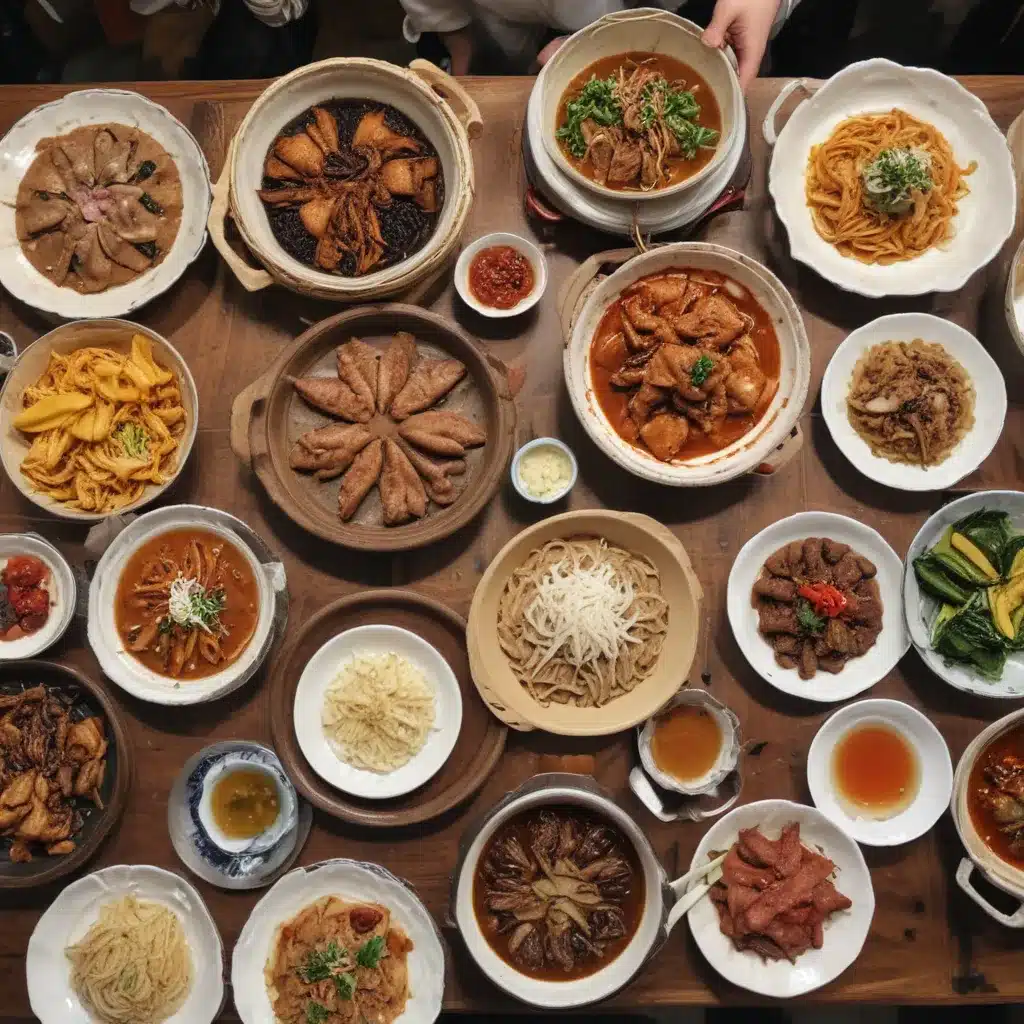
Uncovering the Vibrant Korean Food Scene in the Hub
As a self-proclaimed foodie, I’ve always been intrigued by the diverse culinary landscapes of the world. And when it comes to the rich and captivating cuisine of Korea, I must admit – I’ve been missing out. That is, until I stumbled upon the vibrant Korean food scene right here in Boston.
You see, I’ve always been the type of person who loves to explore new flavors and immerse myself in the stories behind the dishes. So, when a friend mentioned the growing Korean restaurant scene in the city, I knew I had to investigate. And let me tell you, what I discovered was nothing short of a gastronomic revelation.
As I delved deeper into the world of Korean cuisine in Boston, I was struck by the sheer depth and complexity of the flavors. From the bold and fiery kimchi to the delicate and fragrant bibimbap, each dish seemed to tell a tale of its own. I found myself captivated by the intricate interplay of sweet, sour, and umami notes that danced across my palate.
But it wasn’t just the food that captivated me. It was the people, the stories, and the traditions that breathed life into every bite. I had the privilege of sitting down with some of the city’s most passionate Korean chefs and restaurateurs, each with their own unique perspective on the culinary heritage they were proudly sharing with the world.
Discovering the Rich History and Traditions of Korean Cuisine
One such conversation that particularly stood out to me was with Chef Yoon, the owner of Korean Garden Boston. As I sipped on a steaming cup of traditional Korean tea, he regaled me with tales of his family’s culinary legacy, tracing its roots back to the Joseon dynasty.
“You see, the foundations of Korean cuisine are deeply rooted in the country’s rich agricultural heritage,” Chef Yoon explained, his eyes gleaming with pride. “Our ancestors were master farmers, cultivating a diverse array of vegetables, grains, and spices that would eventually become the building blocks of our culinary tradition.”
I listened, enraptured, as he recounted the meticulous techniques and time-honored recipes that had been passed down through generations. From the intricate process of fermenting kimchi to the delicate art of seasoning a perfect bowl of bibimbap, I marveled at the level of care and attention that went into each and every dish.
“It’s not just about the flavors, you know,” he continued, leaning forward conspiratorially. “It’s about the balance, the harmony, the way each element of the meal comes together to create a truly holistic dining experience.”
As he spoke, I couldn’t help but draw parallels to the traditional Chinese and Japanese culinary philosophies I had encountered before. But there was an undeniable uniqueness to the Korean approach – a synthesis of flavors, textures, and cultural influences that was all its own.
Exploring the Vibrant Diversity of Korean Cuisine in Boston
Energized by Chef Yoon’s infectious passion, I set out to explore the breadth of the Korean food scene in Boston, eager to uncover the myriad ways in which this ancient culinary tradition was being celebrated and reimagined in the city.
My first stop was Maru, a cozy and unassuming restaurant tucked away in the heart of Allston. As I stepped through the doors, I was greeted by the tantalizing aromas of sizzling meats and the gentle hum of conversation. The owner, Jihyun, welcomed me with a warm smile and a steaming bowl of kimchi-jjigae, a hearty stew that immediately transported me to the bustling streets of Seoul.
“You know, kimchi-jjigae is more than just a dish – it’s a way of life in Korea,” Jihyun explained as I savored the bold, fermented flavors. “It’s a comfort food, a gathering place, a celebration of our cultural heritage.”
I nodded eagerly, captivated by her genuine enthusiasm and the way she spoke about the dish as if it were an old friend. As I continued my culinary exploration, I encountered similar sentiments time and time again – a deep reverence for tradition coupled with a willingness to experiment and innovate.
At Banchan, a cozy cafe in the heart of Chinatown, I indulged in a symphony of small plates known as banchan. Each dish, from the delicate spinach namul to the crisp, tangy pickled radish, was a work of art, carefully balanced in flavor and presentation.
“Banchan is the foundation of our meals,” the owner, Yoonji, explained as she guided me through the diverse array of offerings. “It’s not just about the individual components, but the way they come together to create a harmonious and nourishing dining experience.”
As I savored each morsel, I couldn’t help but marvel at the intricate dance of sweet, sour, and umami that played across my palate. It was a testament to the depth and complexity of Korean cuisine, a culinary tradition that seemed to unfold in layers, revealing new and captivating flavors with every bite.
Honoring Tradition and Embracing Innovation in Boston’s Korean Food Scene
But the Korean food scene in Boston wasn’t just about preserving tradition – it was also about pushing the boundaries and exploring new and exciting culinary frontiers. And nowhere was this more evident than at Kimchi Taco, a trendy food truck that was quickly becoming a local sensation.
As I approached the brightly colored truck, the aroma of sizzling meats and tangy kimchi wafted through the air, drawing in a hungry crowd of curious Bostonians. I eagerly joined the line, eager to see what culinary marvels awaited me.
When I finally reached the front of the queue, I was greeted by the infectious energy of the owners, Jae and Hana. With a twinkle in their eye, they introduced me to their signature dish – a fusion of Korean and Mexican flavors that they had cleverly dubbed the “Kimchi Taco.”
“We wanted to take the bold, vibrant flavors of our heritage and put a modern, unexpected twist on them,” Jae explained as he carefully assembled my taco. “By blending the spicy, fermented notes of kimchi with the freshness of cilantro and the richness of slow-cooked pork, we’ve created something that’s truly unique and unforgettable.”
As I took my first bite, the flavors exploded on my tongue – a symphony of textures and tastes that left me utterly captivated. The juxtaposition of the crisp, tangy kimchi and the tender, savory pork was nothing short of culinary genius, and I found myself grinning widely as I savored every last morsel.
It was in that moment that I truly understood the essence of the Korean food scene in Boston – a vibrant tapestry of tradition and innovation, where the old and the new coexisted in perfect harmony. From the time-honored recipes of Maru to the boundary-pushing creations of Kimchi Taco, each establishment had found a way to pay homage to the rich culinary heritage of Korea while also carving out their own unique space in the city’s diverse gastronomic landscape.
Embracing the Transformative Power of Korean Cuisine in Boston
As I continued my culinary journey through the streets of Boston, I found myself increasingly captivated by the way in which Korean cuisine was not only delighting the palates of local diners but also transforming the very fabric of the city’s food culture.
At Korean Garden Boston, I witnessed firsthand the power of Korean cuisine to bring people together. The bustling restaurant was a veritable melting pot of cultures, with families, friends, and curious newcomers alike gathered around the communal tables, united by their shared love of the bold, vibrant flavors.
“Korean food is all about community, about sharing, about bringing people together,” Chef Yoon told me, his eyes shining with pride. “It’s not just about feeding the body, but nourishing the soul as well.”
And as I sat there, savoring the intricate flavors of the bibimbap and the addictive crunch of the Korean fried chicken, I couldn’t help but feel a sense of belonging. In that moment, I was no longer just a visitor – I was a part of something larger, a community that celebrated the rich traditions of Korea while also embracing the diverse tapestry of the city.
This sentiment was echoed time and time again as I explored the various Korean restaurants and eateries scattered throughout Boston. Whether it was the warm, welcoming atmosphere of Maru or the infectious energy of Kimchi Taco, I couldn’t help but feel that these establishments were not just serving up incredible food, but also fostering a deeper sense of cultural exchange and understanding.
Conclusion: Embracing the Vibrant Korean Food Scene in Boston
As I reflect on my culinary adventures through the Korean food scene in Boston, I am left with a profound sense of appreciation and wonder. What began as a simple exploration of a new and intriguing cuisine has blossomed into a deep and abiding love for the rich traditions, the innovative spirit, and the transformative power of Korean food in this city.
From the time-honored recipes of Maru to the boundary-pushing creations of Kimchi Taco, I have witnessed firsthand the way in which Korean cuisine is not only delighting the palates of local diners, but also serving as a bridge between cultures, a catalyst for community, and a testament to the enduring power of culinary heritage.
And at the heart of it all is the unwavering passion and dedication of the Korean chefs, restaurateurs, and food purveyors who have made Boston their home. Their stories, their traditions, and their culinary artistry have left an indelible mark on the city, ushering in a new era of culinary exploration and cultural exchange.
So, whether you’re a seasoned Korean food aficionado or a curious newcomer to the cuisine, I urge you to venture forth and immerse yourself in the vibrant, ever-evolving Korean food scene of Boston. For in doing so, you’ll not only indulge your taste buds, but also expand your horizons, deepen your understanding, and connect with a rich and captivating culinary tradition that is truly changing the landscape of this dynamic city.
